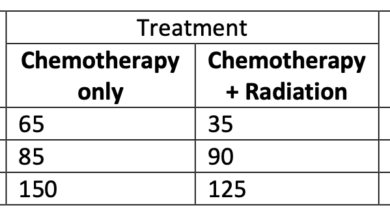
Dont delay breast cancer treatment over fertility fears – Don’t delay breast cancer treatment over fertility fears. This critical issue highlights the complex interplay between a woman’s health and her desire to have children. Many factors contribute to the emotional and psychological pressures surrounding this dilemma, including societal expectations, financial implications, and fear of the unknown.
The fear of jeopardizing future fertility often leads women to postpone or avoid necessary breast cancer treatment. This can have devastating consequences, impacting survival rates and treatment effectiveness. Understanding the potential consequences and exploring options for fertility preservation is crucial for making informed decisions.
Understanding the Issue
Delaying breast cancer treatment due to fear of impacting fertility is a complex issue affecting women across diverse backgrounds. This fear often stems from a combination of emotional anxieties and societal pressures, potentially leading to significant health consequences. Understanding the contributing factors and potential repercussions is crucial for providing effective support and promoting timely intervention.The psychological and emotional factors driving this delay often stem from deeply ingrained societal expectations about women’s roles and the fear of losing their reproductive potential.
Many women grapple with the emotional toll of a cancer diagnosis, adding to the stress of potentially facing treatment that could impact their future fertility. The fear of losing their ability to have children can be overwhelming, and this emotional burden can lead to procrastination in seeking necessary medical care.
Psychological and Emotional Factors
Fear of infertility is a powerful motivator. Women may equate breast cancer treatment with irreversible damage to their reproductive organs, often leading to delayed or hesitant treatment decisions. This fear is compounded by societal pressures that often prioritize motherhood and family building, creating a conflict between the urgency of cancer treatment and the desire to preserve fertility. These psychological anxieties can significantly hinder timely interventions.
Potential Consequences of Delaying Treatment
Delaying breast cancer treatment can have serious consequences for a woman’s health. Cancer progression often accelerates with time, leading to a higher risk of metastasis and decreased effectiveness of treatment options. The later a diagnosis is made, the more extensive the disease may be, requiring more aggressive and potentially more debilitating treatments. This delay can result in reduced survival rates and a lower quality of life.
Societal and Cultural Pressures
Societal expectations regarding women’s roles and the prioritization of motherhood play a crucial role in this decision-making process. The fear of losing the ability to conceive is often heightened by cultural pressures that value childbearing as a defining aspect of a woman’s life. These pressures can be compounded by limited access to information and support systems that address both cancer treatment and fertility preservation options.
Demographic Experiences
The experience of delaying treatment varies across demographics. Younger women, for instance, might be more acutely affected by the fear of losing their chance to have children, while older women may be more focused on other health concerns. Access to healthcare resources, financial stability, and cultural norms also contribute to the variations in experiences. It is essential to acknowledge these differences and provide tailored support to address the unique needs of each demographic group.
Financial Implications
Delaying treatment can lead to substantial financial implications. The cost of advanced-stage treatment, including surgery, chemotherapy, radiation, and potential fertility preservation measures, can be substantial. Further, the longer the cancer progresses, the greater the potential for more extensive and expensive treatment, potentially leading to financial strain and emotional distress.
Stages of Breast Cancer and Treatment Options
| Stage | Description | Treatment Options |
|---|---|---|
| Early Stage (Stage 0-II) | Cancer is localized and has not spread. | Surgery (lumpectomy or mastectomy), radiation therapy, hormone therapy, chemotherapy (in some cases) |
| Late Stage (Stage III-IV) | Cancer has spread to nearby lymph nodes or other parts of the body. | Surgery, chemotherapy, radiation therapy, hormone therapy, targeted therapy, immunotherapy (in some cases) |
Note: This table provides a general overview. Specific treatment plans are determined by individual factors, including the stage, type, and grade of the cancer, as well as the patient’s overall health.
Impact on Treatment Outcomes
Delaying breast cancer treatment can significantly impact survival rates and the effectiveness of therapies. Early detection is crucial for successful treatment, and unfortunately, delaying diagnosis and treatment often leads to more aggressive disease and poorer outcomes. Understanding the correlation between early detection and successful treatment is paramount in empowering individuals to prioritize timely medical intervention.
Impact on Survival Rates
Delayed treatment directly correlates with reduced survival rates. Breast cancer, when detected and treated early, often has a high likelihood of successful treatment and long-term survival. Studies consistently demonstrate a strong inverse relationship between the time from diagnosis to treatment initiation and overall survival. A delay in seeking medical attention allows the cancer to progress, potentially leading to the development of distant metastases (spread to other parts of the body), further complicating treatment and reducing chances of survival.
Correlation Between Early Detection and Successful Treatment
Numerous studies have shown a strong correlation between early detection and successful treatment outcomes. When breast cancer is detected at an early stage, often localized to the breast, surgical removal, radiation therapy, or hormone therapy can effectively treat the cancer. The prognosis is generally much more favorable, and the chances of long-term survival are significantly higher. The effectiveness of treatment is directly related to the size and extent of the tumor, and the earlier it’s detected, the more manageable it is.
For example, a small, localized tumor is easier to surgically remove than a large, invasive one.
Effects of Delaying Treatment on Therapy Effectiveness
Delaying treatment can diminish the effectiveness of therapies. As the cancer progresses, it may become resistant to certain medications or treatments. Furthermore, the extent of the disease and the presence of metastasis at the time of diagnosis can significantly impact the success rate of treatment. This can lead to a more complex and aggressive treatment plan, potentially involving multiple therapies and a longer recovery period.
Comparison of Early-Stage vs. Late-Stage Treatment Success Rates, Dont delay breast cancer treatment over fertility fears
Early-stage breast cancer treatments generally have higher success rates compared to late-stage treatments. In early-stage disease, treatments can often be targeted and localized, leading to a higher probability of complete remission and long-term survival. Late-stage disease, however, may require more aggressive and extensive therapies, and the success rates may be lower due to the advanced nature of the disease.
For instance, a patient diagnosed with stage 1 breast cancer has a significantly higher chance of complete remission compared to a patient diagnosed with stage 4 breast cancer.
Potential for Metastasis with Delayed Treatment
Delaying treatment significantly increases the potential for metastasis. Metastasis occurs when cancer cells spread from the primary site (the breast) to other parts of the body. The longer the cancer progresses untreated, the greater the likelihood of metastasis, which can make treatment more challenging and reduce the chances of long-term survival. Metastatic breast cancer is often more difficult to treat and requires a combination of therapies, potentially including chemotherapy, targeted therapy, and hormonal therapy.
Long-Term Effects of Breast Cancer Treatment on Fertility
Breast cancer treatment can have long-term effects on fertility. Chemotherapy and radiation therapy can negatively impact ovarian function, potentially leading to infertility. The extent of the impact varies depending on the specific treatment regimen and the individual’s age and overall health. Women considering treatment options should discuss the potential impact on fertility with their oncologist.
Don’t delay breast cancer treatment out of fear of impacting your fertility. While concerns about future motherhood are understandable, prioritizing early detection and treatment is crucial. Recent studies suggest that Celebrex, a common medication, might be safer for the heart than previously thought, as detailed in this article. However, this shouldn’t distract from the importance of prompt breast cancer diagnosis and treatment.
Putting off necessary care can have serious consequences. It’s vital to remember that seeking medical advice early is key to successful treatment and preserving all options, including fertility, if desired.
Treatment Options for Breast Cancer and their Impact on Fertility
| Treatment Option | Impact on Fertility |
|---|---|
| Surgery (lumpectomy, mastectomy) | Potentially minimal impact, depending on the extent of the surgery. |
| Radiation Therapy | Can negatively impact ovarian function, potentially leading to infertility. |
| Chemotherapy | High potential for negatively impacting ovarian function and leading to infertility. |
| Hormone Therapy | May have varying impacts on fertility depending on the specific medication. |
| Targeted Therapy | Potential impact on fertility, although generally less significant than chemotherapy. |
This table highlights the potential impact of different treatment options on fertility. Individual experiences and responses to treatment can vary, and it is crucial to discuss the potential impact with a healthcare professional.
Addressing the Fears: Dont Delay Breast Cancer Treatment Over Fertility Fears
Facing a breast cancer diagnosis can trigger a multitude of anxieties, including the fear of losing fertility. It’s crucial to understand that these fears are valid and should be addressed openly and honestly with healthcare providers. Open communication fosters trust and allows for a personalized approach to treatment and fertility preservation.Navigating the complexities of cancer treatment while considering future family planning can be overwhelming.
However, advancements in medical technology and supportive care mean that many options are available to preserve fertility. This proactive approach empowers women to make informed decisions that balance their current health needs with their long-term goals.
Open Communication and Support
Effective communication between patients and their healthcare providers is paramount in managing fertility concerns during breast cancer treatment. This involves openly discussing anxieties about fertility, potential impacts on treatment plans, and the various available preservation options. Patients should feel comfortable asking questions and expressing their concerns without judgment. A collaborative approach ensures that the patient’s wishes and health needs are prioritized throughout the process.
Fertility Preservation Options
A range of options exists for preserving fertility in women undergoing breast cancer treatment. Understanding the diverse approaches allows patients to make well-informed choices. These choices often depend on the individual patient’s circumstances, the stage of the cancer, and the chosen treatment plan.
Fertility-Preserving Surgeries
Some surgical procedures can preserve fertility during or after breast cancer treatment. These options often involve removing and storing eggs or embryos, preserving ovarian tissue, or other specialized procedures. The suitability of these procedures is evaluated on a case-by-case basis by the medical team, considering the individual patient’s needs and treatment plan.
Methods for Preserving Fertility in Women
Different methods exist for preserving fertility in women undergoing cancer treatment. These methods encompass a spectrum of procedures and technologies.
Don’t delay breast cancer treatment out of fear for your fertility. While advancements in cancer treatments are constantly being made, including exploring alternative options like targeted therapies and the role of chemotherapy in the future, as discussed in this fascinating article on is chemotherapy on the way out , it’s crucial to prioritize early detection and treatment.
Facing the disease head-on, rather than letting fear hold you back, is key to better outcomes.
- Egg Freezing: This involves collecting mature eggs from the ovaries and freezing them for later use in in vitro fertilization (IVF).
- Embryo Freezing: Involves fertilizing eggs in the laboratory and freezing the resulting embryos for later use in IVF.
- Ovarian Tissue Freezing: Involves surgically removing ovarian tissue, freezing it, and then potentially transplanting it back to the ovaries later.
- Ovarian Suppression: Involves using medication to temporarily stop the production of eggs to minimize damage from chemotherapy or radiation therapy.
These methods aim to safeguard reproductive potential while allowing patients to undergo necessary cancer treatments. The choice of method is tailored to each individual patient’s specific situation and is discussed with the healthcare team.
Don’t delay breast cancer treatment out of fear of impacting your fertility. While some procedures, like the fat freezing procedure, are proving to have more complications than initially thought, this shouldn’t overshadow the crucial importance of early breast cancer detection and treatment. Prioritizing your health and getting the right care is paramount, and delaying treatment could have serious long-term consequences.
Future Fertility Treatments After Cancer Treatment
The potential for future fertility treatments after cancer treatment is highly dependent on the type of treatment received and the methods used for fertility preservation. Some individuals may need to use assisted reproductive technologies, such as IVF, to conceive after their cancer treatment is complete. In these situations, preserved eggs, embryos, or ovarian tissue can be used in IVF procedures to facilitate pregnancy.
Success rates and individual outcomes vary and are subject to ongoing research and advancements in the field. Many successful pregnancies have resulted from fertility preservation procedures after breast cancer treatment.
Successful Procedures and Case Examples
There are numerous reported cases of successful fertility preservation and subsequent pregnancies in women who have undergone breast cancer treatment. These cases highlight the effectiveness of these procedures and the potential for future motherhood for these women. Specific details about these cases are often kept confidential to respect patient privacy.
Table of Fertility Preservation Options
| Fertility Preservation Option | Suitability for Different Situations |
|---|---|
| Egg Freezing | Suitable for women who want to preserve their fertility before starting treatment, or those who have completed treatment and are planning to use their preserved eggs. |
| Embryo Freezing | Suitable for women who are in a relationship and want to preserve their combined genetic material. |
| Ovarian Tissue Freezing | Suitable for women who are considering future fertility and are at a higher risk for treatment-related infertility. |
| Ovarian Suppression | Suitable for women undergoing chemotherapy or radiation therapy who want to minimize damage to their ovarian function. |
Improving Access to Support
Facing a breast cancer diagnosis can be incredibly overwhelming, and the fear of losing fertility adds another layer of complexity. Navigating this challenging situation requires more than just medical treatment; it necessitates a robust support system. This system should empower patients to make informed decisions, manage their anxieties, and maintain their well-being throughout their journey.Comprehensive support extends beyond the medical realm, encompassing emotional, psychological, and practical assistance.
It involves recognizing the diverse needs of patients and providing tailored resources that address both the medical realities and the personal concerns associated with breast cancer treatment and potential fertility implications.
Importance of Patient Support Groups
Support groups provide a crucial platform for patients to connect with others who share similar experiences. These groups offer a safe space to share anxieties, exchange information, and receive emotional support from those who truly understand. The shared experiences can foster a sense of community and reduce feelings of isolation, a common struggle for those facing this diagnosis.
Support groups can also offer practical advice and coping strategies developed by others who have been through the same battles.
Role of Healthcare Professionals
Healthcare professionals play a vital role in facilitating access to support resources. They should actively inquire about patients’ needs and concerns regarding fertility, and proactively recommend appropriate support groups or counseling services. A supportive and empathetic approach from healthcare providers is essential in helping patients feel comfortable discussing their fears and concerns. Clinicians should also educate themselves on the available resources and support networks in their community.
Creating a Supportive Environment
Creating a supportive environment for patients requires a multi-faceted approach. Hospitals and clinics can implement programs that provide emotional support services alongside medical treatment. This might involve incorporating workshops, support groups, and access to trained counselors within the healthcare setting. Open communication and empathy are paramount in fostering a sense of trust and well-being for patients.
Raising Awareness About Early Detection and Treatment
Raising awareness about the importance of early detection and treatment is crucial. Education campaigns can highlight the potential impact of delaying treatment due to fertility concerns, while simultaneously emphasizing the availability of fertility preservation options. Partnerships with fertility clinics and cancer support organizations can help in educating the public about the importance of timely intervention. Public service announcements can also play a vital role in disseminating this crucial information.
Examples of Successful Support Programs
Several organizations offer comprehensive support programs tailored for patients facing breast cancer and fertility concerns. The Susan G. Komen Foundation, for instance, provides numerous resources, including support groups and financial assistance. Similarly, the National Breast Cancer Foundation offers educational materials and support networks to help patients navigate their treatment. These programs often incorporate workshops on fertility preservation options, counseling services, and peer support groups.
Resources for Finding Support Groups or Counseling Services
Finding the right support system can be challenging, but numerous resources are available online and through local organizations. Websites like the American Cancer Society and the National Comprehensive Cancer Network offer comprehensive information about support groups and counseling services. Local hospitals and clinics also often have referrals for support groups or therapists specializing in cancer-related issues.
Comparison of Support Services
| Support Service | Specific Focus on Breast Cancer Treatment | Specific Focus on Fertility Concerns |
|---|---|---|
| American Cancer Society | Extensive resources on cancer types, treatments, and support | Information on fertility preservation and related support groups |
| National Breast Cancer Foundation | Education materials, support networks, and resources for patients | Information on fertility preservation options and access to support |
| Local Hospitals/Clinics | In-house support groups, referrals to specialists, and emotional support | Referrals to fertility specialists and information on preservation options |
| Online Support Forums | Discussions on various aspects of breast cancer treatment | Specific discussions on fertility preservation and post-treatment concerns |
Potential Solutions

Facing breast cancer can be incredibly daunting, and the fear of delaying treatment due to fertility concerns is a significant barrier for many women. This fear often stems from a lack of readily available information and support, and the potential impact on future family-building aspirations. Fortunately, there are viable solutions to address this challenge, ranging from improved education and research to policy changes and patient empowerment.
Mitigating Fear of Delaying Treatment
Addressing the fear of delaying treatment requires a multi-pronged approach that empowers women with knowledge and support. Clear and accessible information about the risks and benefits of different treatment options, alongside fertility-preserving possibilities, is crucial. This should include transparent discussions with healthcare professionals, providing patients with a comprehensive understanding of their choices.
Education and Awareness Campaigns
Public awareness campaigns play a vital role in destigmatizing the discussion around cancer treatment and fertility. These campaigns should target women of reproductive age, highlighting the importance of early detection and treatment, as well as the availability of fertility-preserving options. Educational materials should be readily available in various formats, including online resources, brochures, and workshops. For example, a campaign featuring real-life stories of women who successfully navigated both cancer treatment and fertility preservation could greatly impact public perception and encourage open dialogue.
Research into Fertility-Preserving Options
Further research into fertility-preserving techniques during cancer treatment is essential. This includes exploring innovative methods to minimize the impact of chemotherapy and radiation on reproductive health. For instance, cryopreservation of eggs or embryos before treatment allows for future pregnancies. Moreover, ongoing research into targeted therapies and radiation techniques that reduce the risk to fertility would greatly enhance treatment options.
Policy Changes to Improve Access to Fertility Services
Improving access to fertility services for cancer patients requires policy changes at the healthcare system level. These policies could include increased funding for fertility preservation programs, extending insurance coverage for these services, and creating more standardized protocols for fertility preservation procedures within cancer care. For example, some countries have already implemented policies ensuring that fertility preservation is included in the overall treatment plan for eligible patients.
Integrating Fertility Concerns into Cancer Treatment Plans
Integrating fertility concerns into cancer treatment plans requires a shift in healthcare practices. This involves establishing dedicated fertility specialists within cancer care teams, creating a clear communication channel between oncologists and fertility specialists, and providing structured patient education and counselling regarding the options available. The inclusion of a fertility specialist as part of the initial consultations and ongoing treatment plan would be a critical step.
Importance of Patient Empowerment
Empowering patients to make informed decisions is paramount. This involves providing comprehensive information, fostering open communication with healthcare providers, and enabling patients to actively participate in the decision-making process. This also includes addressing the emotional and psychological needs of patients and their families. Patient advocates and support groups can play a crucial role in providing encouragement and practical support throughout this challenging journey.
Comparison of Healthcare Systems
| Healthcare System | Approach to Fertility Preservation | Funding & Resources | Patient Empowerment |
|---|---|---|---|
| System A | Integrated approach, fertility specialists part of the treatment team. | Significant funding allocated for fertility preservation. | High level of patient empowerment, with access to counselling and support groups. |
| System B | Separate fertility services, requiring referral. | Limited funding, potentially creating long wait times. | Limited patient empowerment, less access to support services. |
| System C | Varied approaches, dependent on individual facilities. | Funding varies significantly between regions. | Patient empowerment varies, with some facilities providing more support than others. |
Last Point

In conclusion, delaying breast cancer treatment due to fertility concerns is a serious issue with far-reaching consequences. Open communication with healthcare providers, access to fertility preservation options, and supportive resources are essential for empowering women to make the best choices for their health. Early detection and treatment are paramount, and prioritizing these aspects is crucial for improving outcomes and ensuring a positive future.





